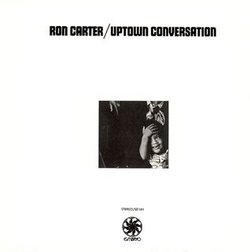A Portrait of the Artist as a Young Man
J. A. Geary | Lakeland, FL USA | 05/14/2004
(4 out of 5 stars)
"Ron Carter was and is one of the greatest acoustic bass players who ever played the instrument. When this album debuted in late 1969, it was a lean and quiet departure from the intense, electrified, visions of the likes of Miles Davis, John McLaughlin and others that were gaining currency at the end of the '60's. In fact, Uptown Conversation is more in the vein of Miles Davis's "Filles de Killimanjaro" release on which Carter and Herbie Hancock were part of Miles Davis's main quartet before Miles sailed off into his "Bitches Brew" fusion phase. Keeping his group on this date to a few solid musicians (Herbie Hancock, Grady Tate, Hubert Laws, Sam Brown and Billy Cobham), Ron Carter stepped to the fore on Uptown Conversation and showed the world that he was not only a solid side man but a serious and mature composer in his own right. The songs on this album range from the upbeat "Einbahnstrasse" and "RJ" to the more moody and introspective "Doom" (a bass and piano dialogue with Herbie Hancock and Grady Tate on drums) and "Half a Row." The noodling "10 Strings" with Sam Brown on guitar (an underrated NY studio musician of that era) is probably the least accessible piece on the record. Nevertheless, it has its interesting moments. I think it and "Half a Row" are too long, and self-absorbed, which is why I give this album 4 stars. My favorite cut on this album is "Little Waltz," a piece that emerges from a tasty and delicate bass solo into a langoruous 3/4 time quartet piece that Bill Evans would have been proud to have written, featuring some nice flute work by Hubert Laws. "Little Waltz" also appeared on an earlier release "Mean What you Say" by the Thad Jones/Pepper Adams Quintet that featured Carter on bass where the melody line is played on flugelhorn (Jones) and baritone sax (Adams). The point here is that in any context, Carter's compositions succeed. Although Carter's "main axe" is his double bass, there are some contributions on piccolo bass and Fender bass. Drummers Billy Cobham (before he went on to the Mahvisnu Orchestra) and Grady Tate (before he became a crooner) really complement Carter's pieces, with Tate turning in some nice brush work on "Little Waltz." Herbie Hancock's piano work is, as always, thoughtful and understated, letting Carter's bass make most of the musical "statements." Ron Carter is a musician's musician. Although this album is nearly 35 years old, there is a great deal on this album that will challenge and delight you. If you're a bass player, you will find his playing as fresh and as relevant today as it was then, and you will learn from a master. That's why this album is still in print and worth owning."
Miles fans, flip it to Side 2
Michael St John | St. Paul, MN | 11/09/2001
(4 out of 5 stars)
"When I first picked this up, judging by the Fall '69 recording date and the musicians involved (Hubert Laws, Herbie Hancock, Sam Brown, Grady Tate, Billy Cobham), I sort of expected to hear some kind of early fusion. A lot of electric piano, some fat, funky drumming. For the most part, that's not what you get here.The first cut is a finger-poppin' groove number, with Ron on Fender bass and Herbie playing electric piano; and then there's no more where that came from. The next track, "Ten Strings," is a duet between Ron and Sam Brown on guitar, mostly featuring Ron's solo musings--and he does sound introspective, as though he's playing for himself. Then "Half a Row" is a trio piece for Ron, Hancock, and Cobham, a ponderous exercise that sounds very avant-garde of the time.If that were all there was to the album, or the rest followed along the same lines, I couldn't recommend it. But then it gets really interesting, especially if you're interested in the music Miles Davis made with Ron and Herbie around '65-67.The next two cuts are pieces for quartet involving Hubert Laws, and sound very much like an extension of the music on ESP or SORCERER, except with flute instead of trumpet/sax. The final two pieces omit Laws, but the trio interaction again reminds me of how Herbie & Ron had played together with Miles (with some arco embellishment by Ron that is reminiscent of his work with Dolphy). The playing on all four pieces of the 2nd side sparkles, and the themes are all memorable. (Bonus alternate takes of the last two pieces are tacked onto the end.)If you're getting this with hopes of some '69 fusion jams, something like Ron Carter's own version of a RED CLAY, then you'll be disappointed with everything after the first track. But if you dig the way the rhythm section plays on those mid-60s Miles records, there is much to enjoy here."
Not one of his best?...not true
Gazzelloni | Cincinnati, OH USA | 06/13/2008
(5 out of 5 stars)
"I don't know what kind of methodology Gene Friedman (the other reviewer) used when coming to his conclusion, but this recording actually is one of Carter's best. The track "Einbahnstrasse" captures Herbie Hancock ablaze, with Billy Cobham battering it out on drums. In addition to being an essential Ron Carter recording to own, it is easily one of the better hard bop albums out there. All seven tracks are originals by Carter, with alternate takes of "Einbahnstrasse" and "Doom." This probably is Ron's best!
Highly recommended"


 Track Listings (9) - Disc #1
Track Listings (9) - Disc #1